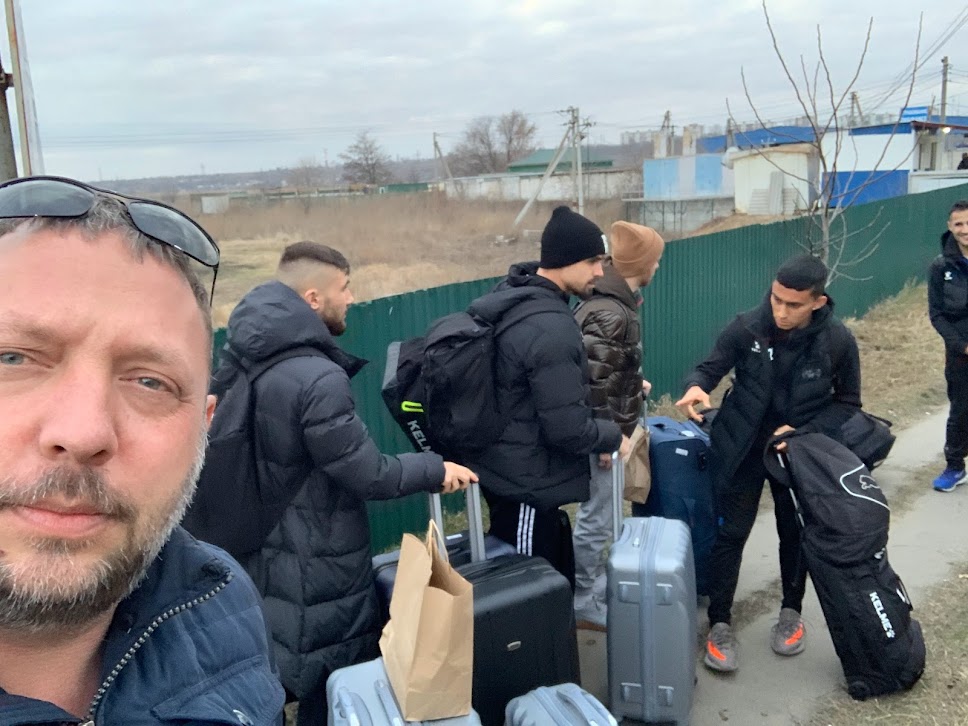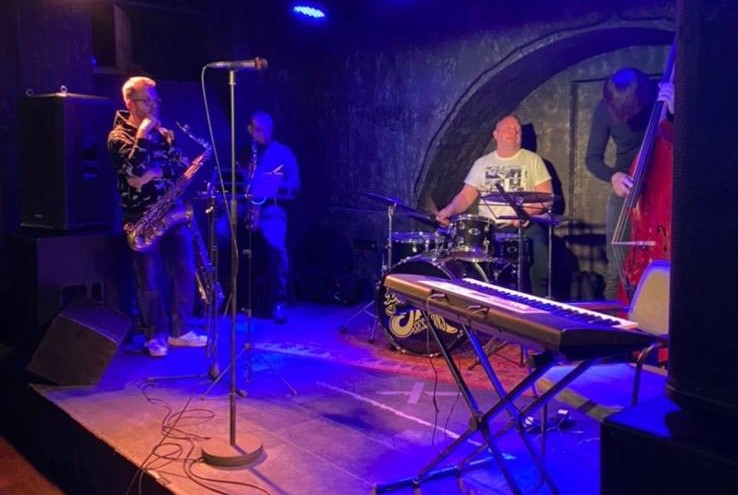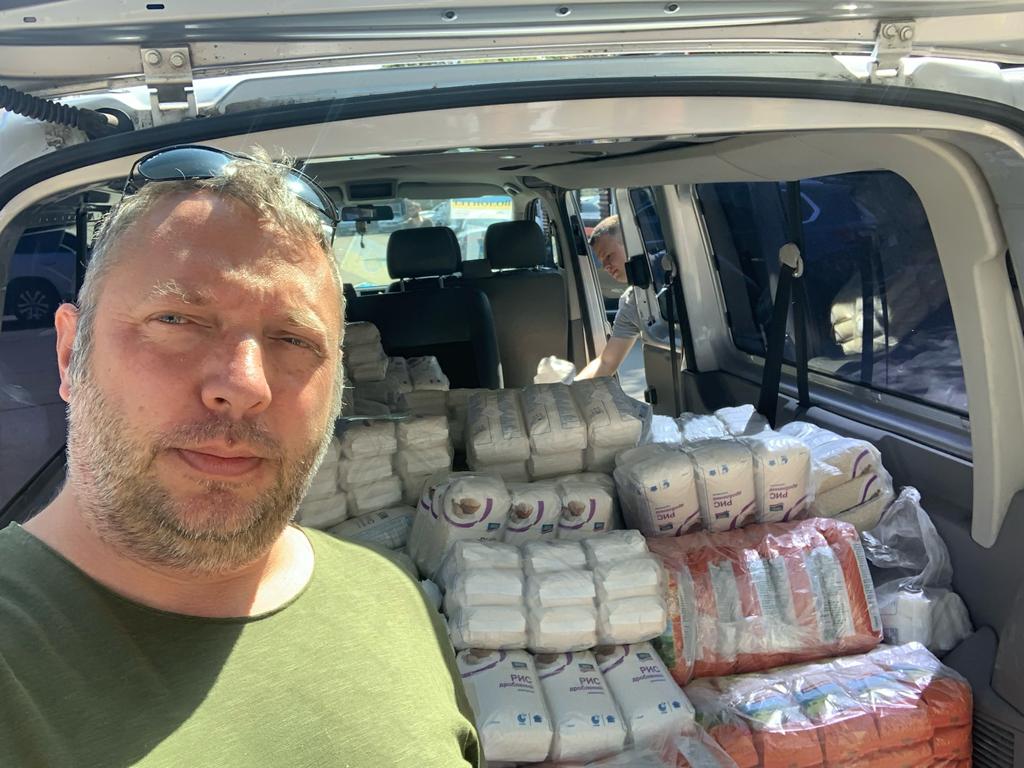
How a Swiss musician is lending a hand to people in Ukraine

Musician Bänz Margot has lived in Ukraine for roughly ten years. He first travelled there shortly after the Maidan Uprising in 2014. But following the Russian invasion, Margot began running his own aid organisation in the country.
Our telephone conversation between Bern and Odessa is interrupted several times. Bänz Margot, a 47-year-old Swiss national, lives in the Ukrainian city on the Black Sea with more than one million inhabitants. In mid-November, Russia stepped up its attacks on the country’s power supply again.
“We are currently on generator power,” says the musician, who found his calling in setting up his own aid organisation for Ukraine. “They haven’t been able to repair the infrastructure for two or three days since the blast. A woman with disabilities is currently sleeping in a corridor. I keep saying, ‘Go to Switzerland!’ But they want to stay.”
The Swiss Abroad are as diverse as the countries in which they live. SWI swissinfo.ch wants to showcase this diversity and is therefore publishing an exciting personal life story from a Swiss Abroad every month.
The music was a sign
What was it that brought this Swiss national to Ukraine? It all began in 2013 at the Buskers Street Music Festival in Bern, where Margot saw a folk music group from Ukraine.
The percussion teacher had never heard music like it before. “I was so impressed that I got in touch with the group. This music and the singing really touched me,” he says.
As fate would have it, his parents knew the singer from the group, having performed with her at a concert years before. In the end, the singer and her husband invited him to visit them in Kyiv. He thought: “If I get the chance, maybe I’ll go sometime.”
Margot knew very little about that part of the world. He says the images he had in his mind of Eastern Europe were characterised by poverty, wars, Stalin, chaos and corruption.
“And then it all started with the Maidan Uprising,” Margot explains. He says he was completely captivated by the protests against then-president Viktor Yanukovych on the large square in Kyiv. A week after the Ukrainian leader was ousted at the end of February 2014, a friend spontaneously booked a flight for him “to Kyiv at 10 o’clock the next morning”. He’d only just arrived in Ukraine when the Russian army moved in to occupy Crimea in the southeast. Instead of four days, he stayed in the country for a month.

Politics and music
Margot grew up as the son of musicians in the Bern region and lived in the capital’s Matte neighbourhood, which runs along the Aare River, from the age of five. Even today, he can still give a few examples of MattenenglischExternal link, the secret language for which this tiny neighbourhood below the city’s old town is known.
Margot had already started playing the piano and drums at the age of three, which he says awakened his passion for the drums. After school, he went to the city’s conservatory vocational school, ultimately receiving a federal diploma in percussion teaching.
Margot gave lessons for several years, but working at a music school was not for him. “I was more of a survival artist,” he says. He explains that he felt like he was in a prison and actually only ever wanted to make music and organise cultural projects. In addition, he says, he was politically active “for a better world, to help poor people and protect animals”.
‘It was all new to me’
In the summer of 2014, Margot travelled to Ukraine again, this time for a longer stretch, and was drawn to Odessa. “That’s when it really took hold of me – not just the protests, but also the food, the people, the East. It was all new to me,” he says. At a two-and-a-half hour flight from Switzerland, he found in Odessa “a completely different world”.
Since that time, Margot has received a residence permit, having lived in Ukraine for at least two of the previous three years. He also had a Ukrainian girlfriend of several years. Before the war, he still came to Switzerland from time to time to earn some money.
But then, at the end of February 2022, the war broke out. When Margot realised that he could be of more assistance from outside the country than on the ground, he fled to Moldova and immediately began helping with aid efforts for Ukraine.
His dedication didn’t go unnoticed, and soon the larger aid organisations began asking him for advice. Eventually friends from Switzerland started sending him money. “I deployed it and reported back to them,” he says.

Financial aid for tens of thousands
He used the money to charter buses, fill them with food, and drive to the front line to evacuate people on the return journey. “There are children and families in need, and people are being slaughtered and raped,” he says. His organisation, Human Front AidExternal link, began under these circumstances.
Eventually, Margot went back to Odessa and began to help from there. He received an unannounced visit from Hugo Fasel, a former director of the charity Caritas Switzerland and a friend of his parents’. Following his advice, the NGO began specialising in direct financial aid.
“It was like when you get unplugged from the Matrix,” says Margot. “Why bring food here when there is enough locally? And why spend the money abroad?” In the beginning, they evacuated around 6,500 people. “And now we are supporting around 20,000 to 30,000 people with emergency financial aid.”
Too little help is being given to Ukraine, believes Margot, who says 15 million people are dependent on humanitarian aid. “They have been fighting a war for democracy and for the Western world for more than 1,000 days,” he says. “The men are being killed – it’s just terrible. I know people who have died.” Meanwhile, more and more buildings and infrastructure are being damaged by Russian missiles. “There are explosions all the time,” he says.
Three questions, three answers
A trait I have brought back from Ukraine…
In Ukraine a coffee costs…
What I miss about Switzerland…
Edited by Balz Rigendinger. Translated from German by Katherine Price/gw

In compliance with the JTI standards
More: SWI swissinfo.ch certified by the Journalism Trust Initiative































You can find an overview of ongoing debates with our journalists here . Please join us!
If you want to start a conversation about a topic raised in this article or want to report factual errors, email us at english@swissinfo.ch.